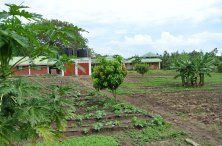Vegetables started to be grown on several garden plots in 2008 to cover the community centre's consumption. But only since 2011 the efforts have been made to develop the farm which is now regarded as the key opportunity to get more quality food for the children and as an important step towards self-sufficiency and sustainability of the whole project. Self-sufficient and sustainable farming could not only improve the quality of food on the Island of Hope, but the income from selling the surplus could eventually cover the operating costs of the centre and ensure its independence of an outside help.
Currently, there are a few vegetable plots being cultivated on the farm. The use of drip irrigation makes it possible to grow vegetables even during dry season and thus increase the crop productivity. There are two fish breeding ponds (Tilapia) on the premises that now enrich the children´s diet on regular basis. Our plan is to extend the fish farming in a form of fish breeding cages placed directly in the pond. In 2013, a poultry farm was established with 400 hens in two separate chicken coops that regularly supply the canteen with eggs.
The surplus of eggs is sold and the money made is used to purchase other food supplies for the kitchen. Since 2013, the farm has its own tractor, that helps cultivate leased fields outside the premises (total of 8 hectares), where corn and beans are grown in large quantities. There have also been planted 60 fruit trees on the farm. Some of them have already started producing fruit, while the other ones present a promise for the future.
What does the farm currently need?
- a new high-quality food storehouse for storing produce
- working tools (spades, hoes, wheelbarrows,…)
- truck for collecting crop from more distant fields (could also be rented for money- more income for the project´s budget)
- investment in rabbit and goat breeding
























